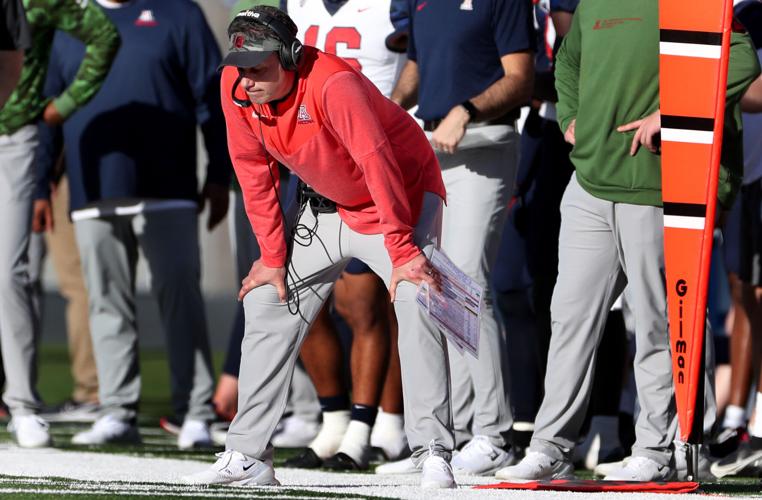The visiting media room in the bowels of Arizona Stadium has concrete walls that must date to the 1920s, a single folding table and a few plastic chairs. It’s as far from the Rose Bowl as you can get in college football.
But when Washington State coach Jake Dickert took a seat for his postgame Q&A session Saturday afternoon, he looked around and said: “This is nice.”
What wouldn’t look nice to a coach whose team has won three straight games after the Cougar defense systematically took Arizona apart, winning 31-20, a game with little suspense and less stress?
“We were locked in,” said Dickert. “I thought we had an electric first half.”
On the other side of Arizona Stadium, UA coach Jedd Fisch sat behind a microphone at the new Bear Down Lounge and said “I’m disappointed. We stopped ourselves more than anything.”
The only debate was whether Arizona stopped itself or if WSU did. It was probably 50-50.
On a day the Wildcats had every reason to add to the bounty of stunning No. 12 UCLA a week earlier, Arizona was a no-show and so was the Tucson football community,
No more than 30,000 walked through the gates at the old stadium (an inflated attendance of 40,717 was announced), and from start to finish the brilliant sunny afternoon had a distinct feeling of deflation.
Where was everybody?
Much of Saturday’s blankness — maybe all of it — was that WSU was superior in every phase of the game. Those foolishly optimistic predictors (like me) had not paid enough attention to the Cougars’ defensive prowess. I mean, WSU leads the Pac-12 in scoring defense, 19 points per game, and if there is ever an indicator of success in this or any league, it’s that defense rules.
“What a defensive performance,” said Dickert. “Our ‘D’ played lights out.”
In a conference blinded by the flash of future NFL quarterbacks and what seem to be weekly 43-42 and 44-41 games between Top-25 teams, the Cougars don’t aim to outscore you. Instead, they disconnect your offense the way the power company turns off your lights.
Dickert, who earned his first full-time head coaching job at WSU after impressive defensive coaching stops at Wyoming and North Dakota State, entered Saturday’s game with something Arizona has rarely seen since the “Desert Swarm” days: A starting lineup loaded with defensive veterans.
It almost didn’t seem fair, given all of the freshmen and sophomores Arizona has been forced to utilize on defense.
The Cougars started nine defensive players who are either redshirt juniors (four-year players) or redshirt seniors (five-year players). They had 68 tackles-for-loss entering Saturday’s game. Arizona, by comparison, had 38.
By the middle of the first quarter it was obvious that WSU’s defense was able to successfully execute their stop-Jayden-de-Laura game plan. The Cougars cut off all of de Laura’s usual escape routes, frustrated him, re-routed him and neutered Fisch’s play sheet.
The final statistics are grossly misleading. Arizona led the Cougars in yards gained, 441 to 354, but none of that mattered because de Laura threw four interceptions and Arizona’s young defense couldn’t match the defensive pressure against Cougar QB Cameron Ward.
Before the game became a mismatch, Ward set up to pass 32 times and was pressured just five times. On the other 27 plays he had a clean pocket, which is the most magical words to a quarterback’s ears.
Ward was rarely rushed and executed WSU’s “Air Raid” offense expertly, taking a snap and quickly throwing to the first receiving option with little or often no resistance from Arizona.

Arizona coach Jedd Fisch watches the final minutes of the Wildcats’ 31-20 loss to Washington State.
Everything WSU tried, offensively and defensively, had some measure of success, and that led to the worst day of de Laura’s Arizona career. If de Laura isn’t on his game, if he’s not sharp, accurate and successful in fleeing pressure, the Wildcats don’t have much of a chance.
“It’s not just sacks,” said Dickert. “It’s getting the quarterback off his spots as much or more as hits and sacks. It all affected the quarterback. At the end of the day, we have a high bar on defense.”
Now what?
Beating ASU in the Territorial Cup would make memories of Saturday’s loss to WSU evaporate. There will be no bowl game, but a greater issue is the lack of game-day support from the Tucson constituency.
Why didn’t that stimulating victory at UCLA fill up the tailgating berths on the UA Mall? Why were there so few ZonaZoo students? The weather was perfect, and Arizona was coming off its most invigorating victory since beating No. 18 Oregon four years ago.
There was no buzz at the ballpark. The community didn’t show up and, perhaps as a result, neither did the Wildcats.
“Today was not good enough,” said Fisch.
This week, his team gets one more chance to make up for Saturday’s no-show.






